Way back in 2014 I spent $50 on a Kickstarter for a promising looking Indie Game called ‘That Which Sleeps’. Per my previous coverage, (1) the (delayed) game is supposedly an ‘evil-returning-god’ simulator where the player manipulates a living world to prepare for their return. The game had a great Kickstarter but since then developers have consistently failed to keep their promises. The game promised to beta in December 2014 yet a year on, 31st December 2015, no beta has been released. (2) On protesting and suggesting contact with the Federal Trade Commission (the US equivalent of Trading Standards in the UK) in October 2015, your author and others received refunds and were removed from the game forums.
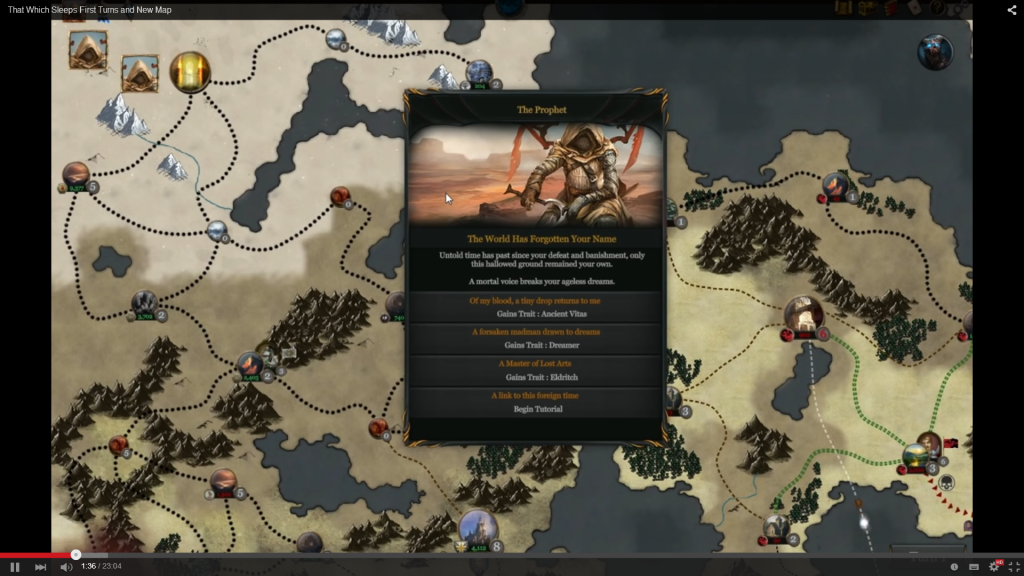
‘That Which Sleeps’ gameplay video. Picture used for the purposes of criticism and review. There has been no beta and this is the second of four promised videos. The other two have not been released. Click for full size.
I do not intend to fully recap the developers’ discourtesy, lack of professionalism or broken promises here. Readers are advised to refer to my previous articles. The high points are that during the Kickstarter the developers claimed that the project was low risk because much of the game was already written. Kickstarter materials stated, “We have a working game” and also that a scenario viewer was complete and ready to release directly after the campaign, which ended in October 2014.
Beta was promised for December 2014, then March 2015 and it is now the 31st December 2015, New Year’s Eve. The supposedly working game is now in its second chronological year of post Kickstarter development. The scenario viewer has never been released although a partially functional map editor has been. After increasingly acrimonious forum posts from backers in October 2015, on 12/10/2015 developer Josh Perry promised some gameplay videos. There were to be three released at one week intervals showing the early, mid and late games. So far only one has been released.
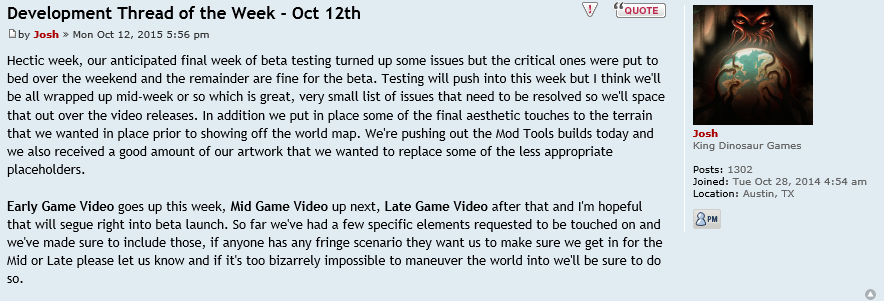
Josh Perry of King Dinosaur Games promised three gameplay videos in October 2015. As of New Year’s Eve 2015, only one has been released. Click for full size.
The video, a screenshot of which is in the header to this article, is concerning. At first it might seem that some of the criticisms levelled by backers are unfair. For example, the map tileset was picked in detailed consultation with backers and the dim colour screen agreed as appropriate. It is better presented than we were promised. The lack of a minimap is not a great concern – a similar and very popular game, Dominions 4, plays just fine without one and instead you can just zoom out the whole map.
What worries your Inquisitor about the video is the amount of progress. The game shows a map, some locations and a unit that can move between them, decrementing an allotted number of moves. Some locations have menus.
In my teens in the late 1990s I sometimes wrote games in QBasic and later C++. At that time I had no software training and by modern standards they were poor but my later games approached the standards of 2D tile games for that era (think Civilisation 1).
One game I wrote and abandoned in C++ was the imaginatively titled ‘Space Game’. The idea was to have a number of planets in space like small Civ 1 maps. The game was set in the distant future. Humanity has been to the stars, advanced in science and understanding to some form of cosmic transcendence, and left.
The game’s factions are some baseline human remnants, some human derivatives and some aliens. The game was never finished as I had to focus on my studies. It is nearly 20 years late and only runs in DosBox on modern PCs. Nonetheless the first and quickest thing I wrote was the data model. Then came a basic working framework. Stars, a starmap, a system map and planet screens. Finally, I made some basic initial units and UI menus. Within a couple of weeks this is what I had with 1990s technology, no budget, a second-hand 286 and a relative’s cast-off Borland Turbo C++ Compiler.
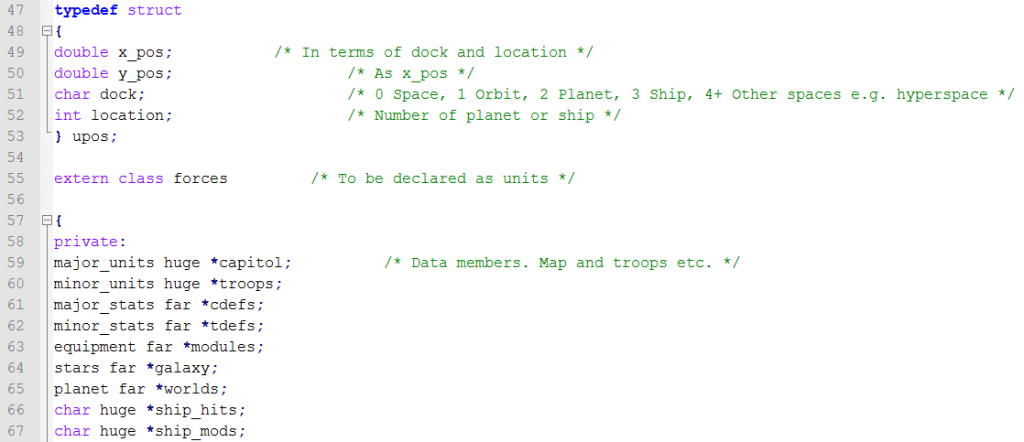
A screenshot of some model code from the never finished late 1990s epic sci-fi adventure, ‘Space Game’. Click for full size.
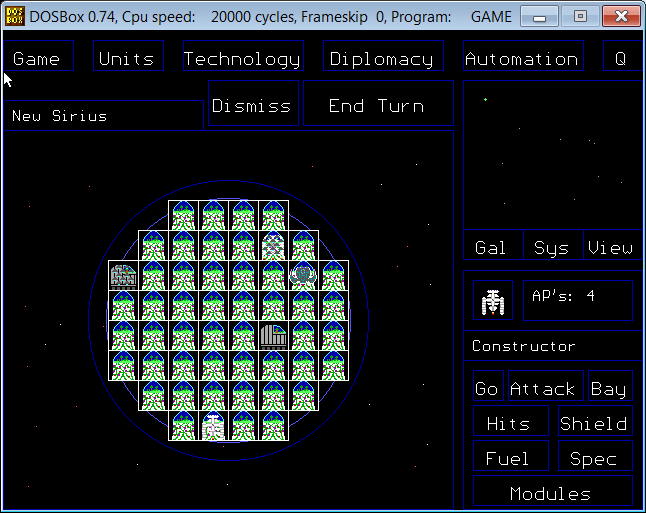
An in-game screen from ‘Space Game’. The top right is showing a sparse test galaxy map. The main screen shows an advanced planet with nanotechnological combined habitat / industry settlements. A capital ship dedicated to construction is selected. Click for full size.
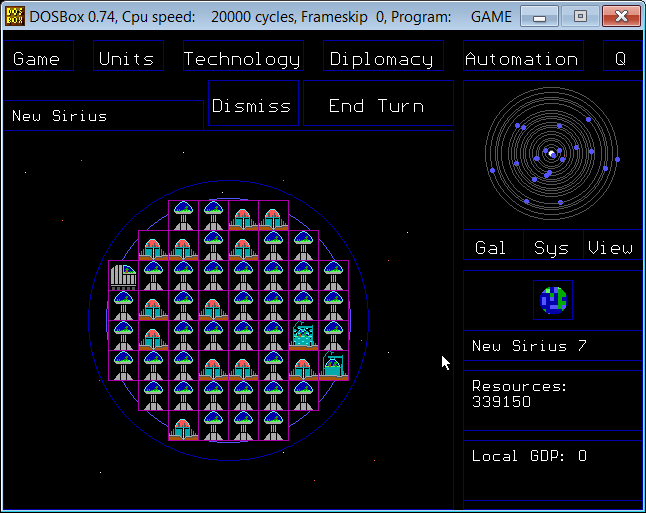
An in-game screen from ‘Space Game’. The top right is showing a star system with many planets. The main screen shows an mid-level planet with habitation and industrial buildings. A couple of construction centres are near the bottom right, one with a squadron of spaceships on it. Click for full size.
These days developers have it far easier. Forget 1990’s tile sprite graphics. Modern middleware like Unity or Monogame will very nearly hold your hand and make you tea whilst it renders textured, anti-aliased 3D scenes for you with custom lighting.
I had to write my own UI library whilst Josh has Unity. Even so with 14 months to work on a game that was supposedly nearly done, $80,000+ of other people’s money and 2010 technology That Which Sleeps has demonstrated less functionality.
We have seen some simple menus. These may look sexy but remember that in programming terms these are basically simple rectangles with purchased art dropped in. Unity provides most of this functionality out of the box. We have seen some tiles rendered to a hex grid and a unit move between a small number of points of interest.
It is not quite a perfect analogy but fundamentally, something is not right here. Josh was telling us back in September that he had been playing through the whole game and everything was looking “pretty solid”, with “no hard crashes”.
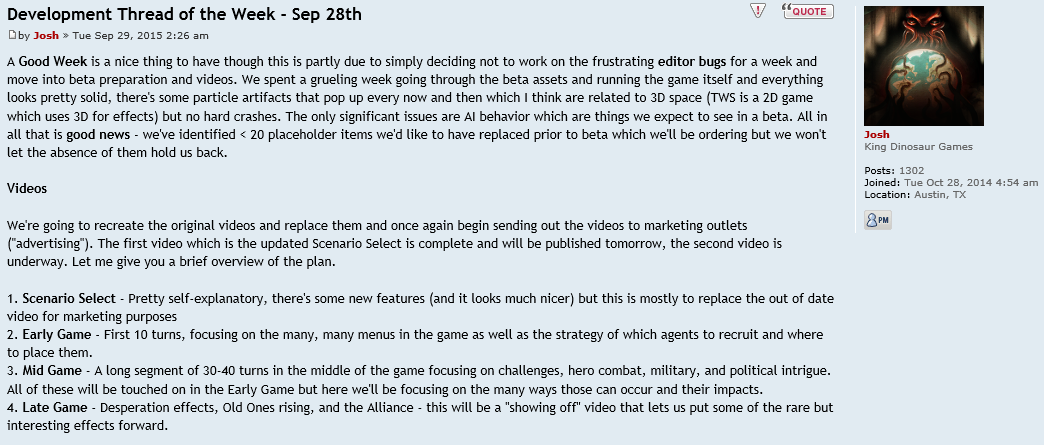
This is the top of a post by Josh from Kind Dinosaur Games posted on 2015-09-29 in response to backer concern. Click for full size.
So where is it? At this point, bored gamers would be better off with Milo Yiannopoulos’ game ‘Journalism Quest’ (MHN Reviewed, 73/100) or even Zoe Quinn’s controversial offering ‘Depression Quest’ (MHN Reviewed, 27/100). For all my criticisms of Quinn’s game, especially its potentially offensive approach to mental health issues, Depression Quest is –
a. cheaper
b. finished
c. has more functionality
On present evidence, Josh Perry is outclassed by Zoe Quinn at game development. One might expect Kickstarter backers to be at the gates with pitchforks and torches at this stage, or contacting the FTC. However, those who have threatened to take action have been refunded and purged. With an echo-chamber / hugbox flavour the game forum has taken on a cult-like atmosphere.
The game’s main developer, Josh, has vastly reduced his presence on the forums since the events of October, citing hurt at criticism and a need to focus on writing the game. This has led to silence and further criticism, until one of the forum moderators began to act as a sort of intermediary (archive here).
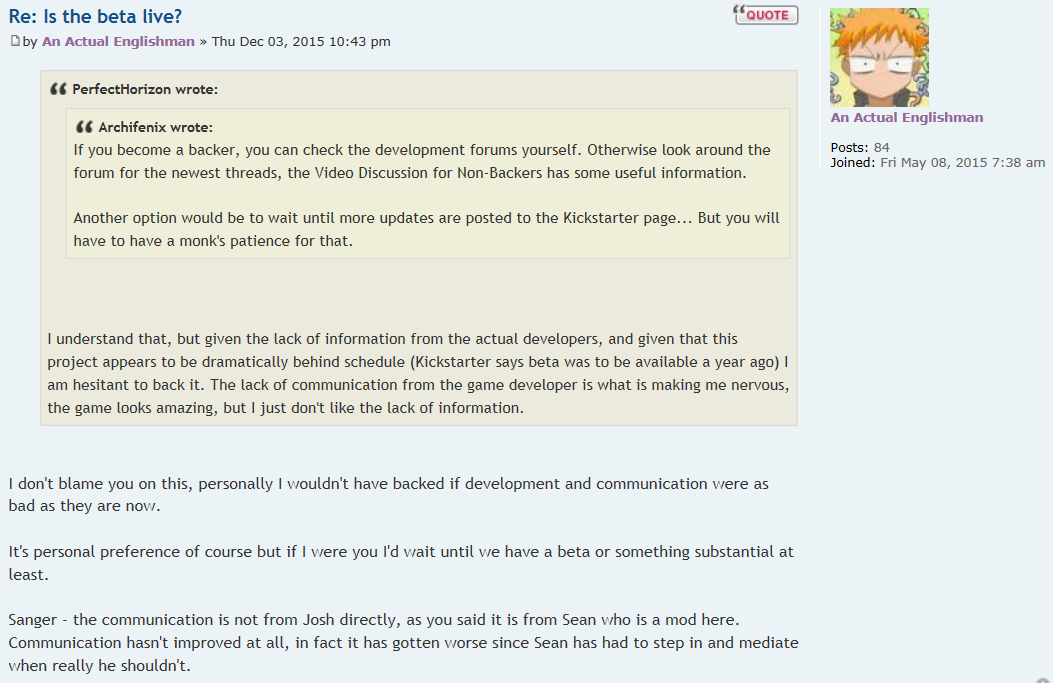
Josh Perry now posts very infrequently on the game forums, with moderators acting as an intermediary. Click for full size.
Whilst some of the less inbred remaining backers have begun to criticise this arrangement, others are literally describing it in cult priest terms. Sean is said to be the High Priest of Josh (archive here).
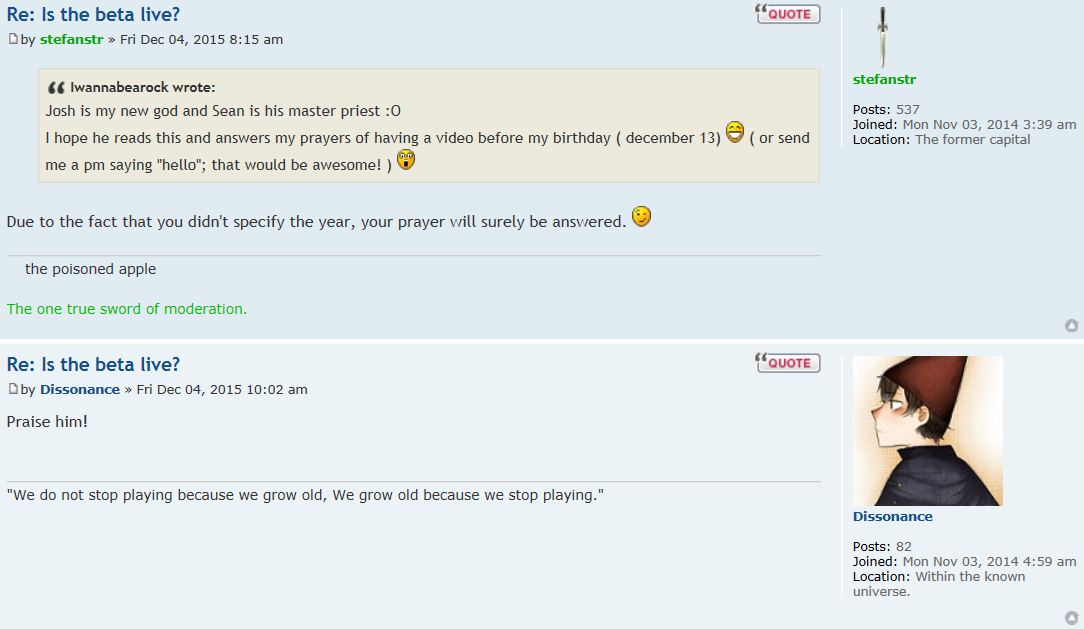
After harsh criticism from backers, heretics were purged and Josh Perry reduced his contributions to the forums for his own, massively late, unreleased game. Moderator Sean now acts as an intermediary. Click for full size.
Of course these statements were partly in jest but the grim reality is that Josh Perry is not a God – not even a false Lovecraftian one. He is a man who has taken over $80,000 from diverse backers. Some of these backers are wealthy but others are students and some vulnerable. $50 is not a lot to me, but a large amount to others. Surely the flock must be beginning to realise by now that with his endless litany of broken promises, Josh Perry is not to be trusted.
For those who would rather not bow down and worship, the FTC have an online complaints form here. I no longer have a contract with KDG, but if other backers are no longer willing to put up with this increasingly surreal farce I suggest that they ask for refunds and if they are not promptly forthcoming, contact the authorities.


Pingback: 10 Most Heartbreaking Indie Game Cancellations - Gamers News Hub